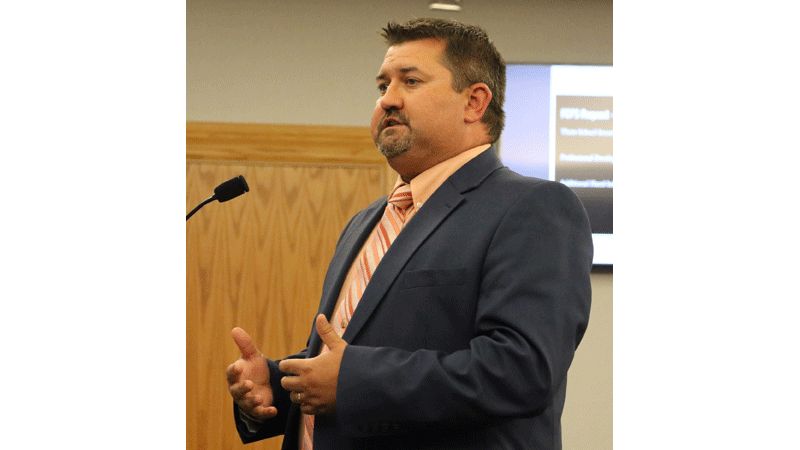Franklin City Public Schools officials give positive review of intersessions
Published 6:16 pm Wednesday, November 1, 2023

- Franklin City Public Schools Director of Operations Dr. Clint Walters recently shared insights on intersessions with the Franklin City School Board that he and At-Large Board Member Carrie Johnson gleaned from a recent trip to Hopewell. (Photo by Titus Mohler)
|
Getting your Trinity Audio player ready...
|
Franklin City Public Schools Superintendent Dr. Carlton Carter has been exploring the option of year-round schools at the elementary and middle school levels in Franklin, and a component of this kind of schedule could be what is known as an intersession.
The U.S. definition of an intersession from the Oxford Languages dictionary is as follows: “a short period between university terms, sometimes used by students to engage in projects outside the normal academic program.”
During the Franklin City School Board’s Oct. 19 meeting, FCPS Director of Operations Dr. Clint Walters provided an update on school calendar planning.
“As part of our work looking ahead, (At-Large Board Member) Ms. (Carrie) Johnson and I had the opportunity to travel to Hopewell and take a look at how their intersession is conducted,” he said. “They operate on a balanced calendar, which means that their summer break is a little bit shorter because it inserts some breaks throughout the school year.
“And during those breaks, teachers offer sessions that may or may not be related to specific SOL standards, and so it’s an opportunity for students to really, again, have fun with their learning,” he continued. “And that was really what we were able to see as their presentation of learning over that week of intersession.”
He shared some images with the board that he took on the trip to highlight work that the students in Hopewell were doing.
“They were creating comic strips that helped to sequence, in telling a story,” he said.
He noted that the intersession featured a focus on art, with students tie-dyeing T-shirts.
A group of students also traveled to Richmond to go to a museum.
“They were able to get a bunch of different experiences during their intersession,” he said. “Some (experiences) did have some curricular ties.”
He invited Johnson to share her thoughts on the trip.
“I was just blown away by these intersessions,” she said. “And I will counter what he said that not everything was tied to the curriculum; I would say that everything was tied to the curriculum.
“Although some of the sessions were overtly tied to the curriculum, such as learning about ancient Rome and some of them did have direct remediation with math and English, the other ones that appeared to be just fun, like tie-dyeing or baton twirling or putting some artwork together, they had elements that were tied to the curriculum that we don’t normally teach in the classroom because they’re not tested on a standardized test, like the oral language skills that we need our children to know — how to communicate with other people,” she added.
She provided an example, referencing displays that highlighted student projects.
“When we went around to see all of these displays, it wasn’t just laid out on a table,” she said. “There were students behind these tables or circulating in these rooms, and we were able to go up and ask them questions about their projects, and they were able to tell us about these projects. So they were encouraged to tell us what they learned, so they had to work on their communication skills.”
She was impressed with how teachers in the intersession managed to connect fun activities to learning.
“Even the kids in the pre-K classroom, one of the things that really struck me was they had a big pumpkin, and they had scooped some of it out,” she said. “And you know how kids like to get their hands all gooey and everything; the kids wanted to stick their hands in and get seeds out of the pumpkin. Well, they were allowed to, but if they got seeds out of the pumpkin, they had to take the seeds to an adult that was in the room, and they had to tell the adult about the seeds.
“So one of the little kids turned around, and I was standing there, and she brought them up to me, and she says, ‘These are seeds. You can put them in the dirt, and they’ll grow a pumpkin,’” Johnson added. “So they still got to play with the seeds, which they thought were fun, but they connected it to learning.”
Both Johnson and Walters were struck by the level to which the students desired to be part of the intersession.
“These intersessions were optional learning opportunities,” Johnson said, “but it didn’t matter the age of the child that we spoke to; every child that we spoke to wanted to be there and was excited to be there and looked forward to the other opportunities that they had for other intersessions.
“So it was like a win all the way around,” she continued. “They learned how to work PowerPoints, which they need when they’re back in school. They learned how to sequence, they learned how to write, they learned how to speak, and I was just like, these are things that we don’t have time for in the regular classroom, and my mind was just spinning (at the possibilities). … It was just a magnificent thing to see.”
Walters said, “Just to reiterate what Ms. Johnson shared, every child that we interacted with, my question to them was, ‘Did you have a good time in intersession? Did you want to be here?’ And the answer was, ‘Absolutely, yes.’
“They kept explaining how much fun they were having with what they were learning,” he added. “So given the option of either staying at home or coming to school, they were choosing to come to school, and that just really, really struck me.”
Johnson also noted how teachers tried to connect a field trip with the activities they had planned for students.
As an example, she explained that some middle school students were given the activity of picking a historically black college and university to research. They later were able to visit a couple such institutions.
“There were field trips connected to all of these different things, and it’s just stuff that we don’t have time to do during the normal, regular calendar that they’re taking advantage of, and it was great,” she said.
Walters added, “And that group was a middle school group that’s already thinking about the time beyond high school. So what a great opportunity to begin those thoughts, those aspirations and the research into those next steps.”






